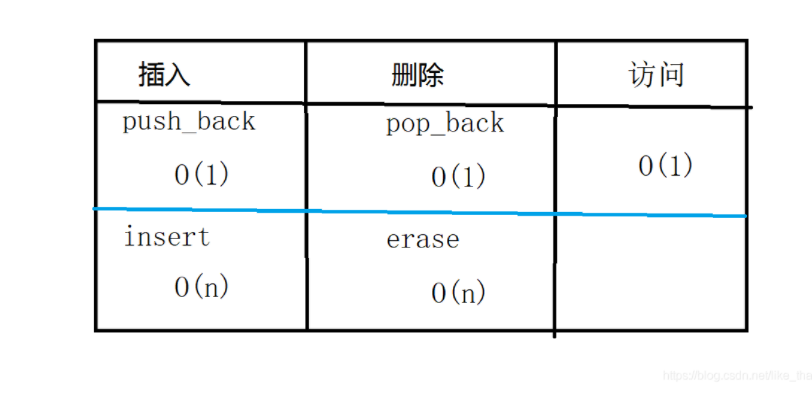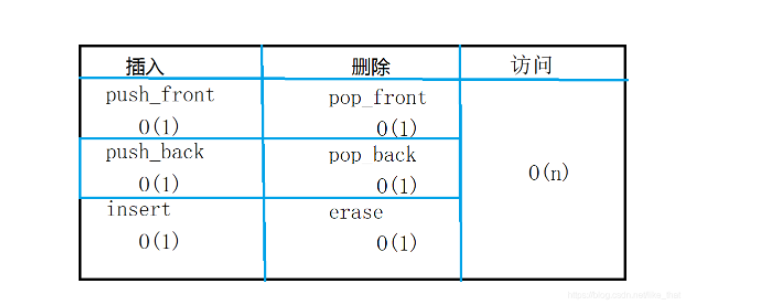STL的API参数都是迭代器
vector (可以发现如果只是对当前数组的开头和结尾进行操纵,数组模拟比较好O(1),如果对中间进行操纵用哪个都是O(n)
切记 对结尾插入O(1)删除O(1) 其他都是O(n)
对开头和结尾进行操纵 用deque
仅对结尾操纵 直接数组模拟 或 vector
对开头进行操纵 最省时间 肯定是deque

1 支持任何位置插入 O(n)
vector <int> alls;
for(int i = 1 ; i <= 5 ; i ++)
alls.push_back(i);
for(auto t : alls)
printf("%d ", t);// 1 2 3 4 5
printf("\n");
alls.insert(alls.begin() + 2, 6);// 1 2 6 3 4 5
for(auto t : alls)
printf("%d ",t);
2 支持任何位置(段)删除
vector <int> alls;
for(int i = 1 ; i <= 5 ; i ++)
alls.push_back(i);
for(auto t : alls)
printf("%d ", t); // 1 2 3 4 5
printf("\n");
alls.erase(alls.begin() + 2);// 1 2 4 5
alls.erase(alls.begin(), alls.begin() + 2);//[alls.begin(), alls.begin() + 2) 3 4 5
for(auto t : alls)
printf("%d ",t);
3 支持STL自带二分函数 O(logn)
vector <int> alls;
alls.push_back(0); //为使下标从1开始 可以在开头插入一个无关的不影响条件的数
for(int i = 1 ; i <= 5 ; i ++)
alls.push_back(i);//
int t = lower_bound(alls.begin(), alls.end(), 8) - alls.begin();
if(t == alls.size())// >= 8 的第一个数
printf("No\n");
else
printf("%d\n", alls[t]);
int t = upper_bound(alls.begin(), alls.end(), 8) - alls.begin(); // > 8 的第一个数
4 支持翻转数组 O(n)
for(int i = 1 ; i <= 5 ; i ++)
alls.push_back(i);
// reverse(alls.begin(), alls.end()); 会改变容器本身
vector <int> alls;
for(int i = 0 ; i < 3 ; i ++)
alls.push_back(0);
for(auto t : vector <int> (alls.rbegin(), alls.rend())) //只是倒着读 不会改变本身
printf("%d\n",t);
if(alls == vector <int> (alls.rbegin(), alls.rend()))
printf("YES\n");
5.sort用法
sort(alls.begin() ,alls.end()); //正向从小到大排列
for(auto t : alls)
printf("%d\n", t);
printf("\n");
sort(alls.rbegin(), alls.rend()); //反向从小到大 正向从大到小
for(auto t : alls)
printf("%d\n", t);
6.邻接表
vector <int> alls[maxn]; //相当于开了maxn个vector
无法传入函数
7.vector二维数组
vector < vector <int> > alls(n, vector <int> (m, 0)) ; //相当于开了 n * m 的矩阵 且初始化为0
可以传入函数
void bfs(vector <vector <int> > &alls) //会对alls原序列进行改变
void bfs(vector <vector <int> alls) // 会对传入的东西 进行复制一份, 不改变原序列
multiset 和 set 自带排序 插入logn
auto t = mt.lower_bound(0);
*t 为当前>=0的第一个值 返回不了下标!!!!!!!!
两者仅有唯一的区别,multiset可存储重复元素,set只能存储唯一的元素
1 支持删除元素
multiset <int> mt;
for(int i = 1 ; i <= 5 ; i ++)
mt.insert(i); // 1 2 2 3 4 5
mt.insert(2); // (删除容器中第一个>=2的元素)
mt.erase(2);//(删除所有值为2的元素) mt.erase(mt.lower_bound(2))
for(auto t : mt) // 1 3 4 5 1 2 3 4 5
printf("%d ",t);
mt.erase(mt.begin()); //删除单个元素
mt.erase(mt.begin(), mt.end()) // 删除整段元素
// mt.erase(mt.begin(), mt.begin() + 5)(这种不知道为什么 运行不了。。。。)
2 自带二分函数(比STL本身的快) (返回值为迭代器)
multiset <int> mt;
for(int i = 1 ; i <= 5 ; i ++)
mt.insert(i);// 1 2 2 3 4 5
mt.insert(2);
auto t = mt.lower_bound(0); // *t 为 当前的值 返回不了下标!!!!!!!!
if(t != mt.end())
printf("%d\n", *t);// *(--t) 为当前的前一个数
else
printf("No\n");
deque(支持开头和结尾插入和删除,O(1)) 其他都是O(n)

deque <int> dq;
dq.push_front(1); //在开头插入1
dq.push_front(3); //在开头插入3
dq.push_back(4); //在结尾插入4
dq.pop_front(); //从开头删除
dq.pop_back(); //从结尾删除
dq.insert(dq.begin() + 1, 5);// 在下标为1的位置上插入5 时间复杂度为O(n)
dq.erase(dq.begin(), dq.begin() + 2); // 删除[0, 2) 之间的元素!!!


插入删除的时间复杂度是多少?
vector和数组一样,不会省时间,但是方便。
好吧
搜了搜网上 好像也没有比较详细的时间复杂度,vector插入删除基本上都是O(n)的,把之前数组中的某一个删去,然后把后边的前移,时间复杂度也是O(n),但是写着方便。